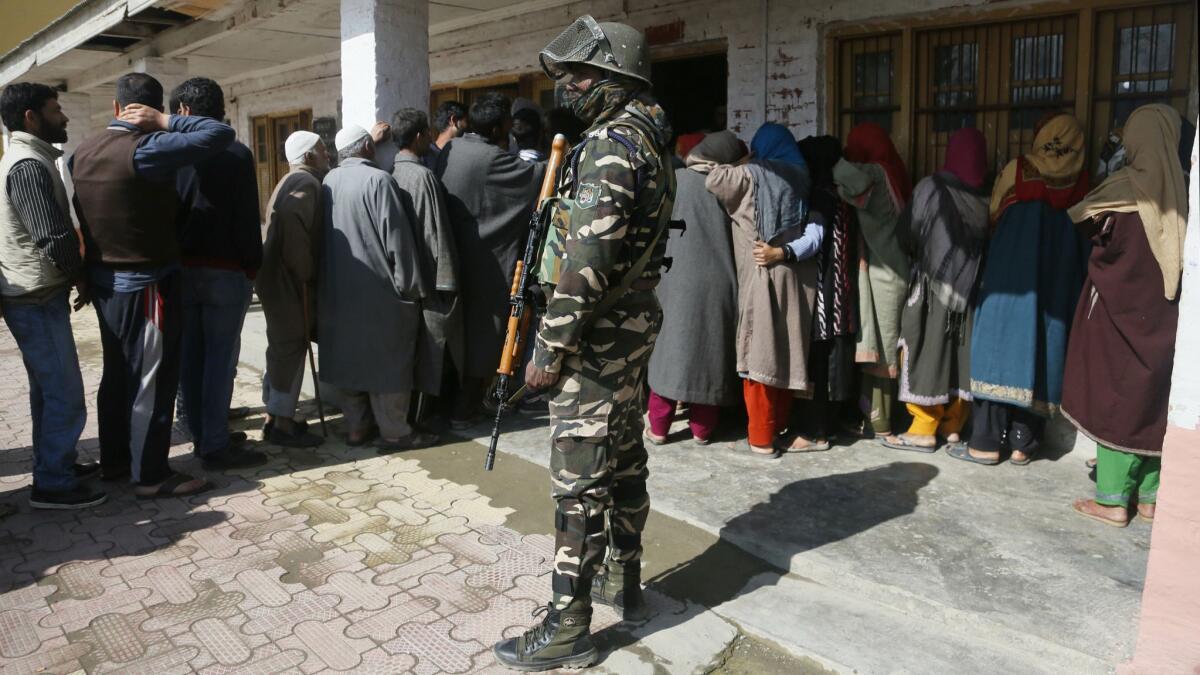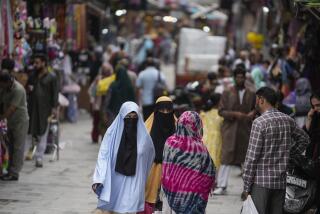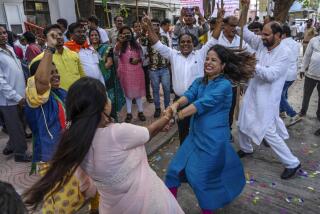2nd phase of Indian elections ends amid Kashmir lockdown

- Share via
Reporting from Srinagar, India — Voting in the second phase of India’s general election on Thursday remained largely peaceful amid massive security and a lockdown in parts of the main city in Indian-controlled Kashmir.
Indian officials said the turnout was more than 60% across 13 Indian states where voting took place.
Kashmiri Muslim separatist leaders who challenge Hindu-majority India’s sovereignty over the disputed region urged a boycott of the vote, calling it an illegitimate exercise under military occupation. Most polling stations in Srinagar appeared deserted, with more police, paramilitary soldiers and election staff than voters. Srinagar was one of 95 constituencies that voted Thursday.
A majority of residents heeded the separatists’ call for a boycott, with only about 8% voter turnout in Srinagar, the urban heart of the anti-India revolt.
Anti-India protests and clashes erupted at several places during the voting, officials said. At least four people were injured when government forces fired bullets, shotguns and tear gas to quell protests by stone-throwing residents.
“This is not our vote. Our vote will be on the day we’re allowed to exercise a plebiscite” on Kashmir’s status, said Intizar Ahmed, a young trader in Srinagar. Another resident, Abdul Hamid, said he only voted in the hope that a Kashmiri representative in India’s Parliament will seek a resolution of the disputed region’s status.
Authorities shut down mobile internet service and closed some roads with steel barricades and razor wire as soldiers and police in riot gear patrolled the streets. However, men and women in long queues voted briskly in Kashmir’s Hindu-dominated Udhampur constituency, where turnout was roughly 65%, officials said.
The Indian election is taking place in seven phases over six weeks in the country of 1.3 billion people. Some 900 million people are registered to vote for candidates to fill 543 seats in India’s lower house of Parliament. Voting concludes on May 19 and counting is scheduled for May 23.
RELATED: In India’s election, male politicians have a new mantra: women first »
The election, the world’s largest democratic exercise, is seen as a referendum on Prime Minister Narendra Modi and his Hindu nationalist Bharatiya Janata Party. The campaigning has been marred by accusations, insults and unprecedented use of social media for fake news.
Also voting Thursday was Tamil Nadu state in the south, where tens of thousands lined up to cast their ballots for 37 seats. Voting was postponed for the Vellore seat following the seizure of $1.57 million in unaccounted cash allegedly from the home of a local opposition politician, Kathir Anand.
His party accused federal tax authorities of raiding the homes and offices of party leaders running against Modi’s party. The governing party in the state, All India Anna Dravida Munnetra Kazhagam, is an ally of Modi’s party.
The Election Commission said authorities had recovered $29 million from leaders, workers and supporters of various political parties in the state in the past month. They suspect the money was for buying votes.
In vote-rich Uttar Pradesh state, election officials directed authorities to provide drinking water and sun shelters at polling stations to cope with the scorching summer heat, said Vekenteshwar Lu, the state’s chief electoral officer.
Modi promised big-ticket economic reforms, but with unemployment rising and farmers’ distress aggravated by low crop prices, his party has adopted a nationalist pitch trying to win the majority Hindu votes.
RELATED: India’s Narendra Modi, battling for reelection, gets a questionable Bollywood boost »
A report by Azim Premji University in India’s southern state of Karnataka, released on Wednesday, said 5 million men lost their jobs between 2016 and 2018, coinciding with Modi’s demonetization program aimed at curbing black market money by taking high currency notes out of circulation. The decision ultimately hurt the poor, while most of the illicit funds re-entered the banking system.
The report said the overall unemployment rate in India was around 6% in 2018, double the average between 2000 and 2011.
Modi has used Kashmir to pivot away from his economic record, playing up the threat of rival Pakistan, especially after the suicide bombing of a paramilitary convoy on Feb. 14 that killed 40 soldiers, in a bid to appear a strong, uncompromising leader on national security. The bombing brought nuclear rivals India and Pakistan close to the brink of war.
Opposition parties have consistently said that Modi and his party leaders are digressing from the main issues such as youth employment and farmers’ suicides. The main opposition Congress party has dubbed him a “national disaster.”
Kashmir is divided between India and Pakistan and both claim the Himalayan territory in its entirety. Rebels have been fighting Indian control since 1989. Most Kashmiris support the rebels’ demand that the territory be united either under Pakistani rule or as an independent country, while also participating in civilian street protests against Indian control.
Anti-India unrest has risen significantly since Modi came to power in 2014 amid a rise in Hindu nationalism and attacks against Muslims and other minorities.
Modi supporters say the tea seller’s son from Gujarat state has improved the nation’s standing. But critics say his party’s Hindu nationalism has aggravated religious tensions in India.
More to Read
Sign up for Essential California
The most important California stories and recommendations in your inbox every morning.
You may occasionally receive promotional content from the Los Angeles Times.












